Biography
Napoleon Bonaparte was a brilliant commander, a diplomat, possessed excellent intelligence, phenomenal memory and amazing efficiency. The whole era is named after him, and his acts became a shock for most contemporaries. His military strategies are in textbooks, and the norms of democracy of Western countries are based on "Napoleon law".
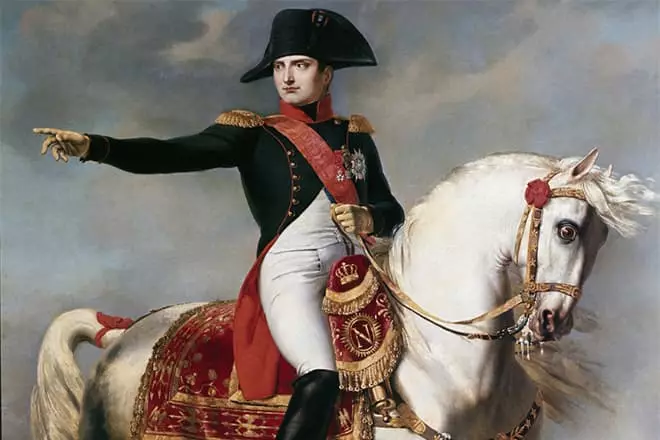
The role in the history of France of this outstanding personality is ambiguous. In Spain and Russia, he was called an antichrist, and some researchers consider Napoleon a few embellished hero.
Childhood and youth
Brilliant commander, statesman, emperor Napoleon I Bonaparte was a native of Corsica. On August 15, 1769 was born in the city of Ajaccio in a poor nobility family. The parents of the future emperor had eight children. Father Carlo Di Buonaparte led the law practice, mother of Leticia, nee Ramolino, raised children. By nationality, they were Corsicans. Bonaparte is the Tuscan version of the famous Corsican surname.
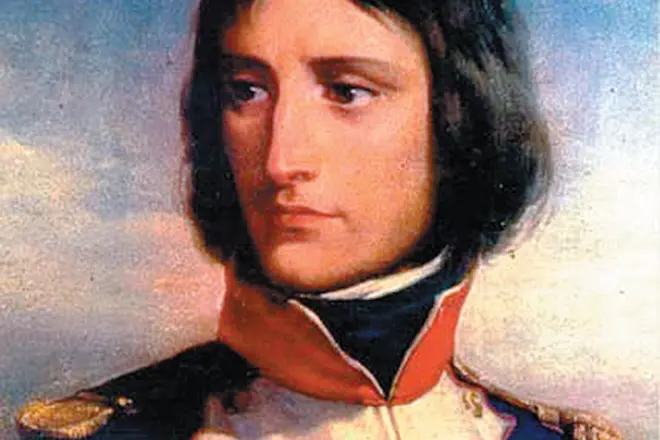
His literacy and sacred history were taught at home, in six years they were given to a private school, in the Ten-year-old age - to the Odenis College, where the boy stayed for a long time. After college continues to study at the Baryna Military School. In 1784 enters the Paris Military Academy. At the end, the title of lieutenant receives and from the 1785th serves in artillery.
In early youth, Napoleon lived secludedly, was fond of literature and military affairs. In 1788, being at Corsica, participated in the development of defensive fortifications, worked on a report on the organization of the militia, etc. He considered the literary works paramount, hoped to become famous on this field.
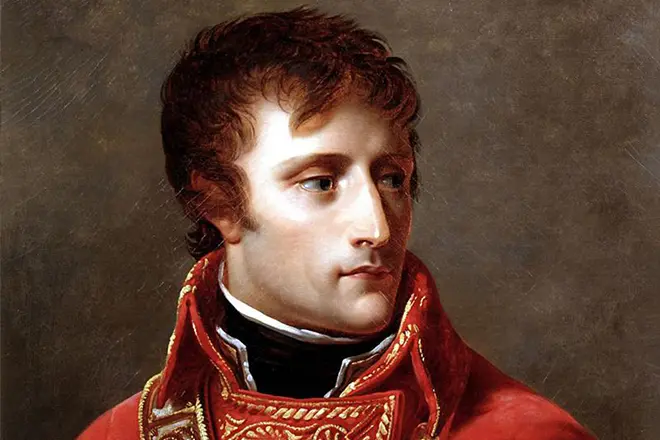
With interest he reads books on history, geography, the size of state revenues of European countries, works on the philosophy of legislation, is fond of ideas Jean-Jacques Rousseau and Abbot Reynal. He writes the story of Corsica, the story of the "conversation about love", "the disguised prophet", "Count Essex" and leads a diary.
The writings of the young Bonaparte except for one remained in manuscripts. In these works, the author expresses negative emotions in relation to France, considering it the enslave of Corsica, and the love of his homeland. New Napoleon's records are political tint and permeated by the revolutionary spirit.
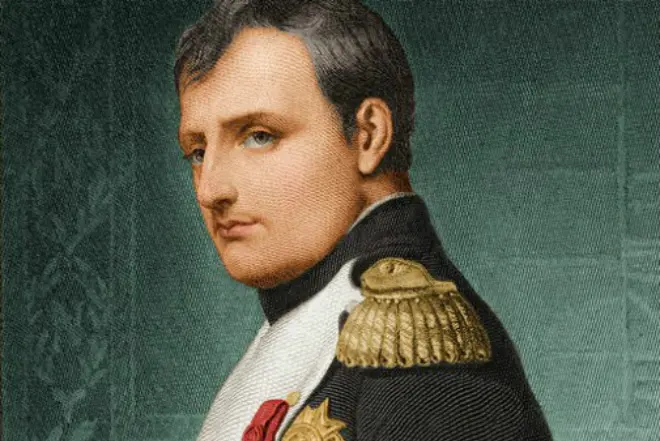
The French Revolution Napoleon Bonaparte meets with enthusiasm, in 1792 enters the Jacobin club. After the victory over the British for the capture of Toulon in 1793, the title of a brigade general is honored. This becomes a turning point in his biography, after which the brilliant military career begins.
In 1795, Napoleon differs in the acceleration of the rebellion of royalists, after which the army commander is appointed. The Italian campaign undertaken in 1796-1797 under his command demonstrated the talent of the commander and glorified him to the entire continent. In 1798-1799, the Directory sends him to the Fallen Military Expedition to Syria and Egypt.
The expedition ended with defeat, but it was not considered for failure. He leaves army armatifully to fight Russian under the command of Suvorov. In 1799, General Napoleon Bonaparte returns to Paris. Directory mode at this time already at the peak of the crisis.
Domestic politics
After the coup and the proclamation of the consulate in 1802, he becomes an consul, and in 1804 - the emperor. In the same year, with the participation of Napoleon, a new civil code is published, which was the basis of Roman law.
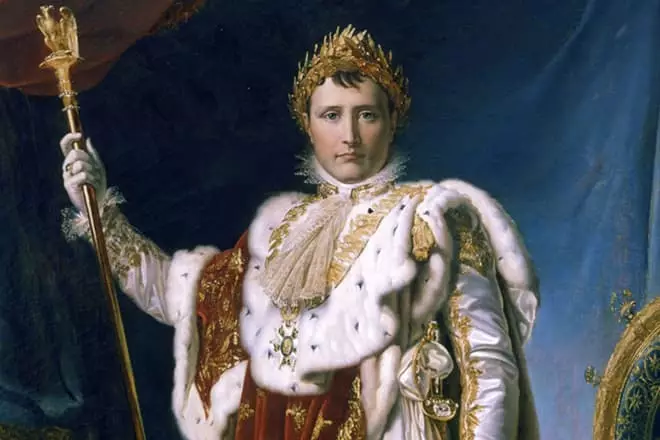
The internal policy carried out by the emperor is aimed at strengthening its own power, which, in his opinion, guaranteed the preservation of the revolutions of the revolution. Conducts reforms in the field of law and administration. They have taken a number of reforms in the legal and administrative spheres. Part of these innovations and now make up the basis of the functioning of states. Napoleon was discontinued anarchy. A law was adopted, providing the right to property. Citizens of France were recognized as equal in rights and opportunities.
Mayors were appointed to cities and villages, a French bank was created. The revival of the economy began, which could not even rejoice even the poor layers of the population. Sets in the army allowed to earn a poor. Fields opened throughout the country. At the same time, the police network expanded, a secret department earned, the press was tough censorship. Gradually there was a refund to the monarchical system of government.
An important event for the French authorities was an agreement concluded with the Pope of Roman, thanks to which the legality of the Bonaparte authorities was recognized instead to proclaim Catholicism to the main religion of most citizens. The society in relation to the emperor was divided into two camps. Part of the citizens declared that Napoleon betrayed the revolution, but Bonaparte himself believed that he was the successor of her ideas.
Foreign policy
The beginning of the board of Napoleon accounted for a while, when France led hostilities with Austria and England. The new victorious Italian campaign eliminated the threat from the French borders. The result of hostilities was the subordination of almost all European countries. In the territories that were not included in France, the provisions of the Kingdom's emperor were created, whose rulers were members of his family. Russia, Prussia and Austria enclose the Union.
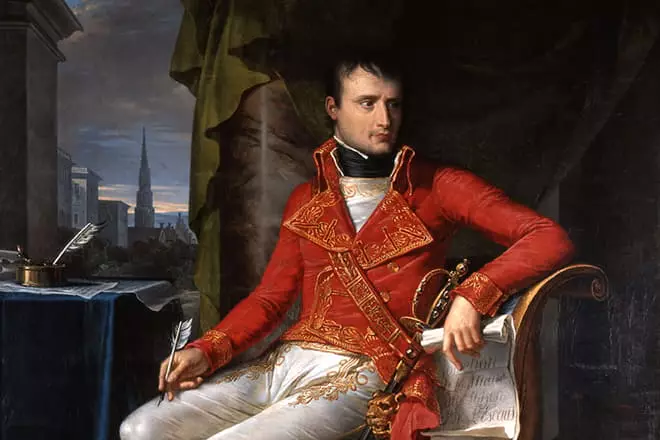
At first, Napoleon was perceived as a Savior Motherland. The people were proud of his achievements, the country had a national climb. But the 20-year-old war of all tired. The continental blockade, proclaimed by Bonaparte, which led to the economy of England, its light industry, forced the British to stop trading relations with European states. The crisis hit the port cities of France, the delivery of colonial goods was discontinued to which in Europe had already got used to. Even the French courtyard suffered from lack of coffee, sugar, tea.
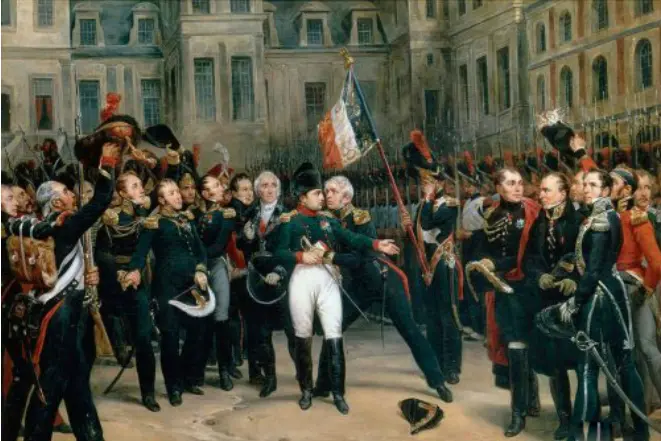
The situation was aggravated by the economic crisis of 1810. The bourgeoisie did not want to spend money on the war, since the threat of attacking other countries remained in the distant past. She understood that the goal of the emperor's foreign policy is to expand its own power and the protection of the interests of the dynasty.
The beginning of the wreck of the empire was 1812, when Russian troops defeated the Napoleonic army. The creation of the anti-armnce coalition, which included Russia, Austria, Prussia and Sweden, in 1814 it became the collapse of the empire. This year she defeated the French and entered Paris.
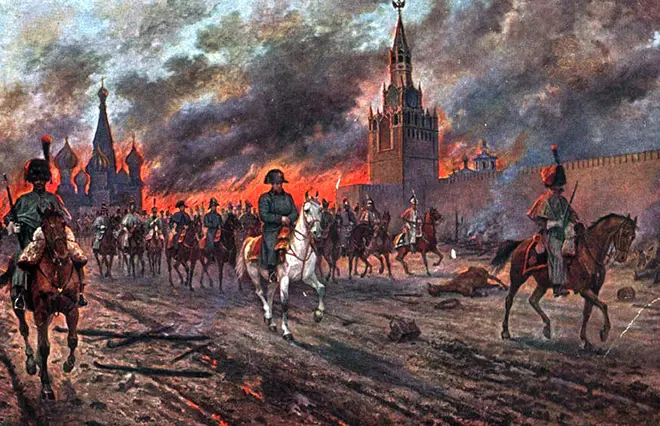
Napoleon had to renounced the throne, but the status of the emperor was preserved behind him. He was referred to the island of Elba in the Mediterranean Sea. However, the reference emperor stayed there for long.
French citizens and the military were dissatisfied with the situation, feared the return of Burbones and nobility. Bonaparte makes Escape and March 1, 1815 moves to Paris, where he is met by enthusiastic exclamations of citizens. Military actions are resumed. In history, this period entered as a "one hundred days." The final defeat of the Napoleonic troops occurred on June 18, 1815 after the battle at Waterloo.
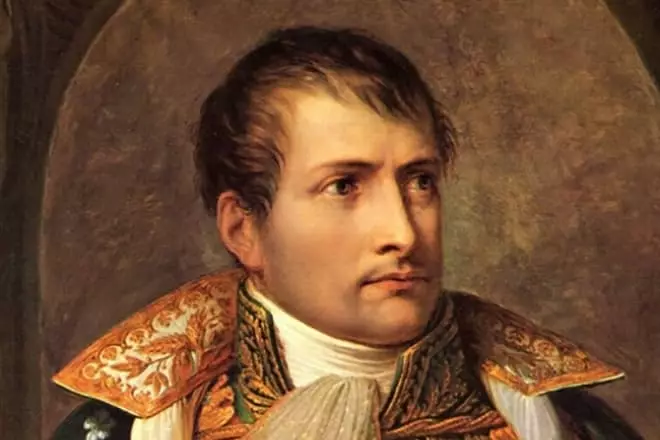
The overthrown emperor was captive by the British and was sent back to the link. This time he found himself in the Atlantic Ocean on the island of St. Helena, where she lived for another 6 years. But not all the British treated Napoleon negatively. In 1815, George Byron, impressed by the fate of the overthrown emperor, created a "Napoleonic cycle" out of five poems, after which the poet was reproached in nonpatarity. Among the British there was another fan of Napoleon - Princess Charlotte, the daughter of the future George IV, for the support of which the emperor counted at one time, but she died in 1817 during childbirth.
Personal life
Napoleon Bonaparte from a young age was distinguished by pleasure. Contrary to popular belief, the growth of Napoleon was higher than the meanings existing in those years - 168 cm, which could not not attract the attention of the opposite sex. Mushroom features, posture, which are visible on the reproductions presented in the form of a photo, caused interest among the ladies around him.
The first beloved, which a young man made an offer, was the 16-year-old Desire-Eugene-Clara. But at that time, his career in Paris began to develop rapidly, and Napoleon did not resist the charm of Parisian. In the capital of France, Bonaparte preferred to start novels with women older than himself.
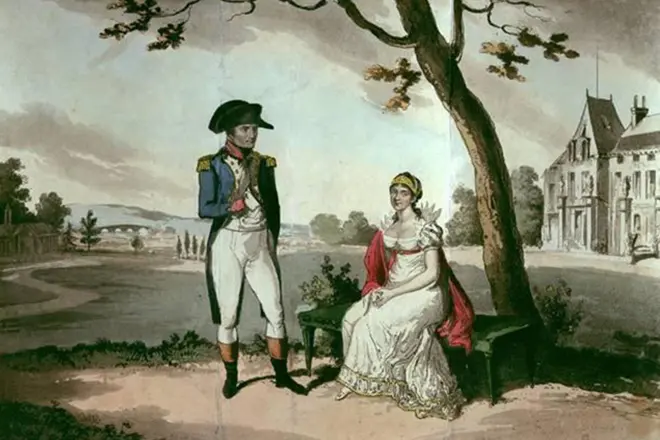
An important event of the personal life of Napoleon, held in 1796, was his marriage in Josephine Bogarne. Beloved Bonaparte was older than 6 years. She was born in a planter family on the island of Martinique in the Caribbean. From the age of 16, she was married to Vicontite Alexander de Bogarne, born two children. Six years after the marriage, it was divided with his spouse and one time lived in Paris, then in the father's house. After the revolution, 1789 again went to France. In Paris, her former husband was supported, by that time held a high political post. But in 1794, Viscoths were executed, and Josephine herself spent some time in prison.
A year later, I woining freedom, Josephine met Bonaparte, who was not so famous. According to some information, at the time of dating, she consisted of a love connection with the then ruler of France by Barras, but it did not prevent him from becoming at the wedding of Bonaparte and Josephine witness. In addition, Barrasi complained to the groom's position of the Commander of the Italian Army of the Republic.
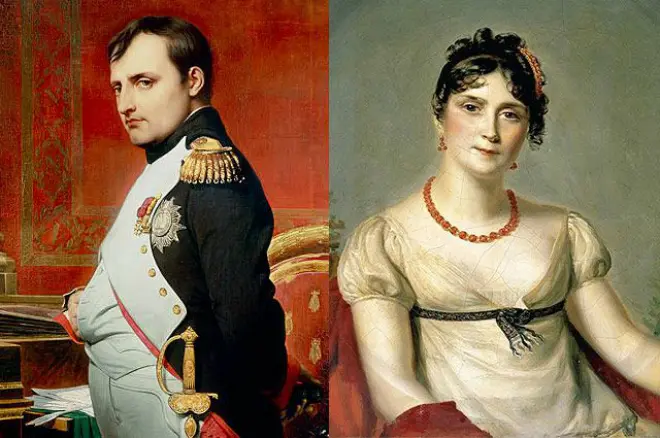
Researchers argue that Lovers have a lot of lovers. Both were born away from France on the small islands, learned deprivation, sat in prison, both were dreamers. After the wedding, Napoleon went to the position of the Italian army, and Josephine remained in Paris. After the Italian campaign, Bonaparte was sent to Egypt. Josephine was still not followed by her husband, but enjoyed a secular life in the capital of France.
Tormented by jealousy, Napoleon began to start a favorite. According to the estimates of researchers, the beloved by Napoleon was from 20 to 50. A number of novels were followed, which led to the emergence of illegitimate heirs. It is known about two - Alexander Colonne-Valevsky and Charles Leone. The genus of column-Valevsky has survived to this day. Alexander's mother became the daughter of the Polish Aristocrat Maria Valevskaya.
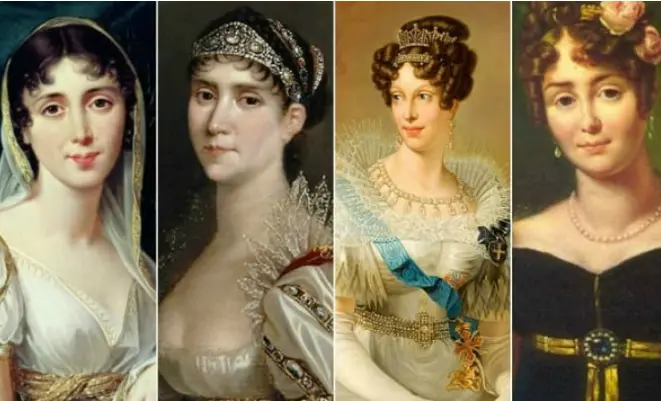
Josephine could not have children, so in the 1810th Napoleon divorces her. Initially, Bonaparte planned to breed with the imperial family of Romanov. He asked the hands of Anna Pavlovna from her brother Alexander I. But the Russian emperor did not want to rush to the ruler not royal blood. In many ways, these disagreements affected the cooling of relations between France and Russia. Napoleon marries the daughter of Emperor Austria Maria-Louise, who in 1811 gave birth to him the heir. This marriage was not approved by the French public.
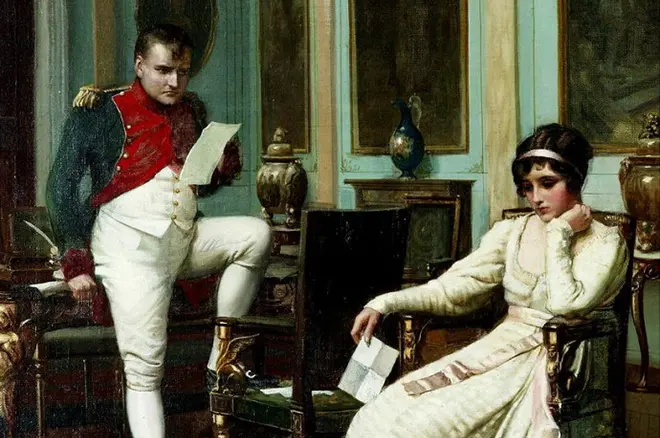
Ironically, subsequently, the grandson Josephine subsequently, and not Napoleon becomes the French emperor. Her descendants reign in Denmark, Belgium, Norway, Sweden and Luxembourg. The descendants of Napoleon did not remain, as his son had no children, but he himself died with a young.
After exploring the island of Elba Bonaparte, he expected to see the rightful spouse next to him, but Maria-Louise went to the owner's possession. Maria Valevskaya arrived at Bonaparte with her son. Returning to France, Napoleon dreamed of seeing only Maria Louise, but the emperor did not receive a response to all letters sent to Austria.
Death
After the defeat of Waterloo Bonaparte Corotal time on the island of St. Helena. The last years of his life were filled with suffering from the incurable disease. On May 5, 1821, Napoleon I Bonaparte died, he was 52 years old.
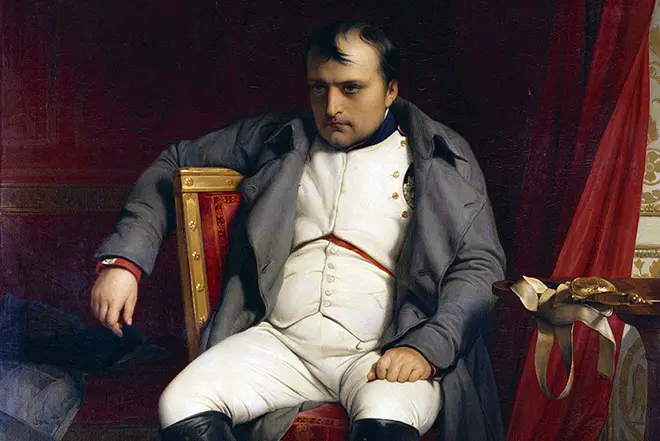
According to one version, the cause of death was oncology, on the other - arsenic poisoning. Researchers who hold the versions of the stomach cancer appeal to the results of the autopsy, as well as to the heredity of Bonaparte, whose father died of a stomach cancer. Other historians mention that before death, Napoleon Tolstie. And it became an indirect sign of the poisoning of arsenic, since the patients are losing weight with oncology. In addition, in the hair of the emperor later, traces of arsenic of high concentration were revealed.
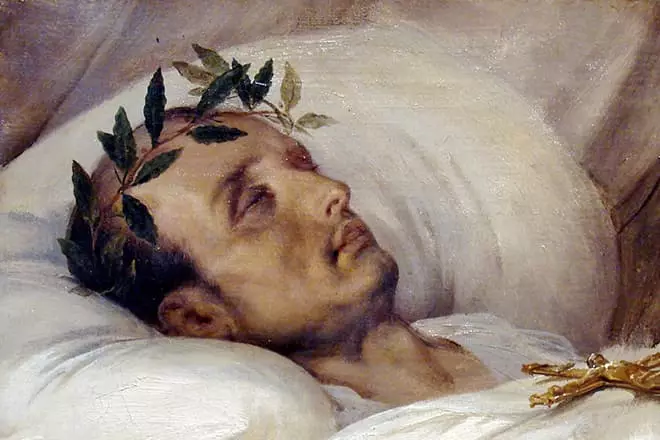
According to Napoleon's will, his remains were transported to France in 1840, which are reburied in the Paris House of Persons with disabilities in the Cathedral. Around the tomb of the former emperor the French exhibited sculptures made by Jean Jacques Pradier.
